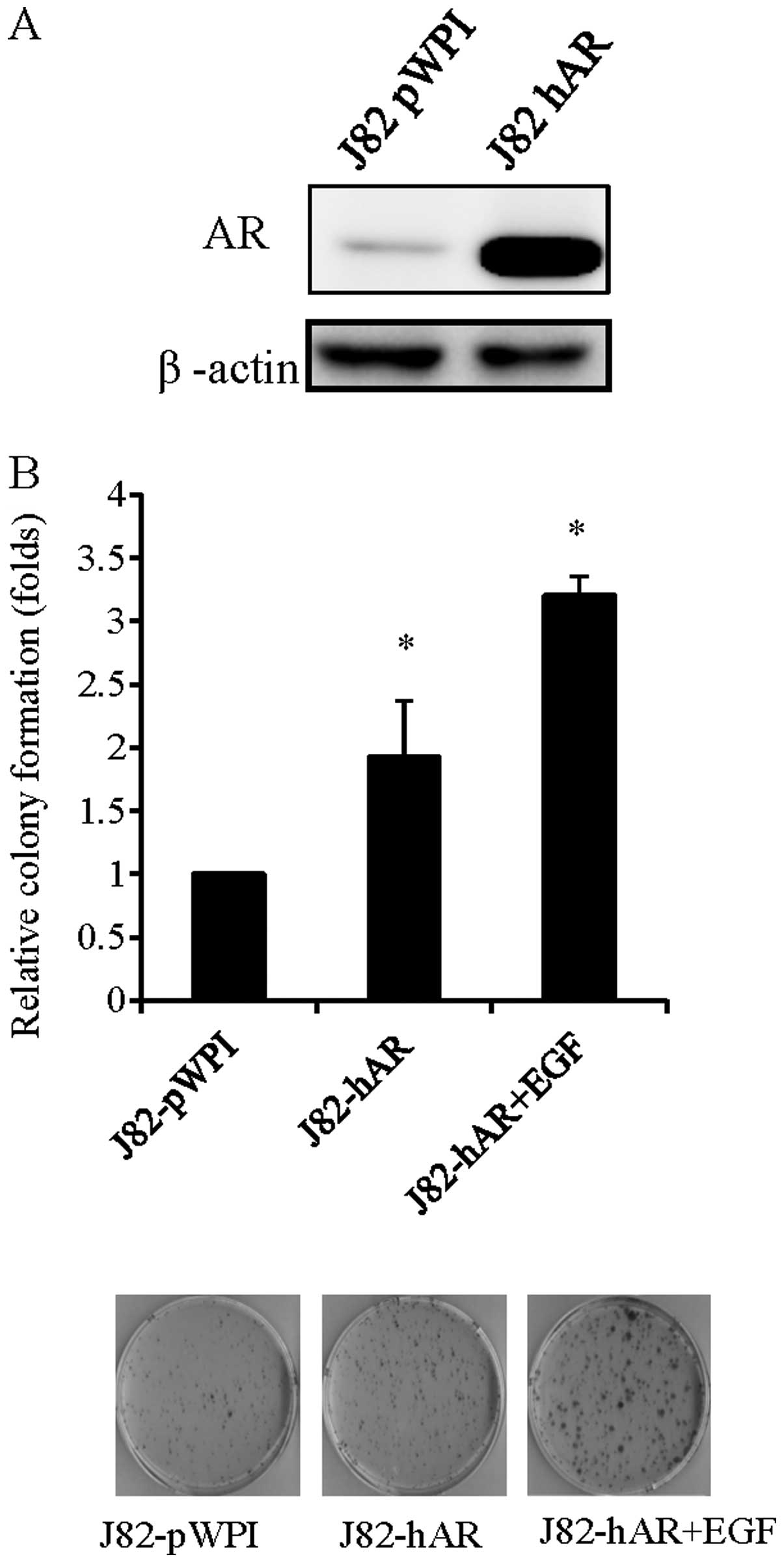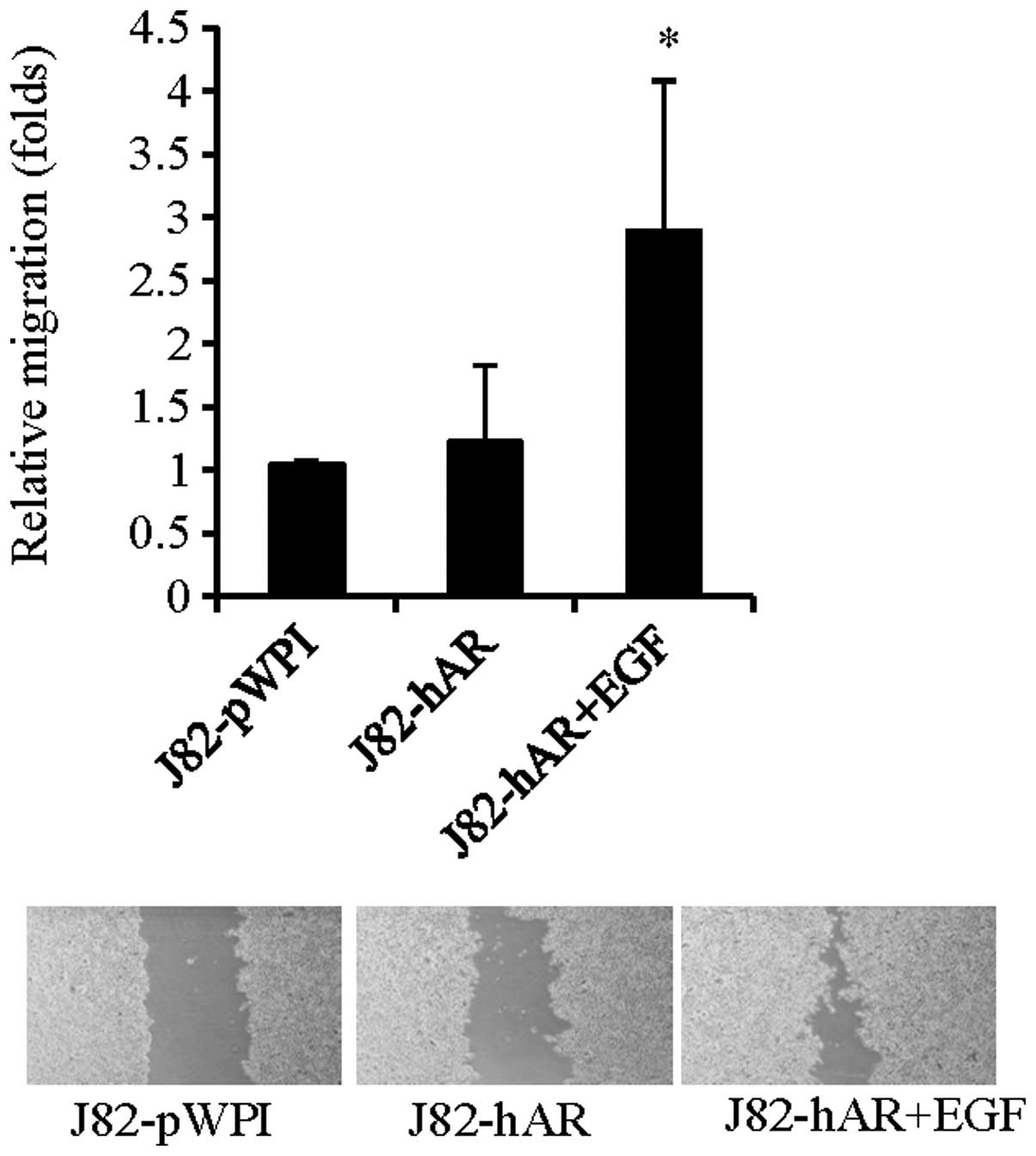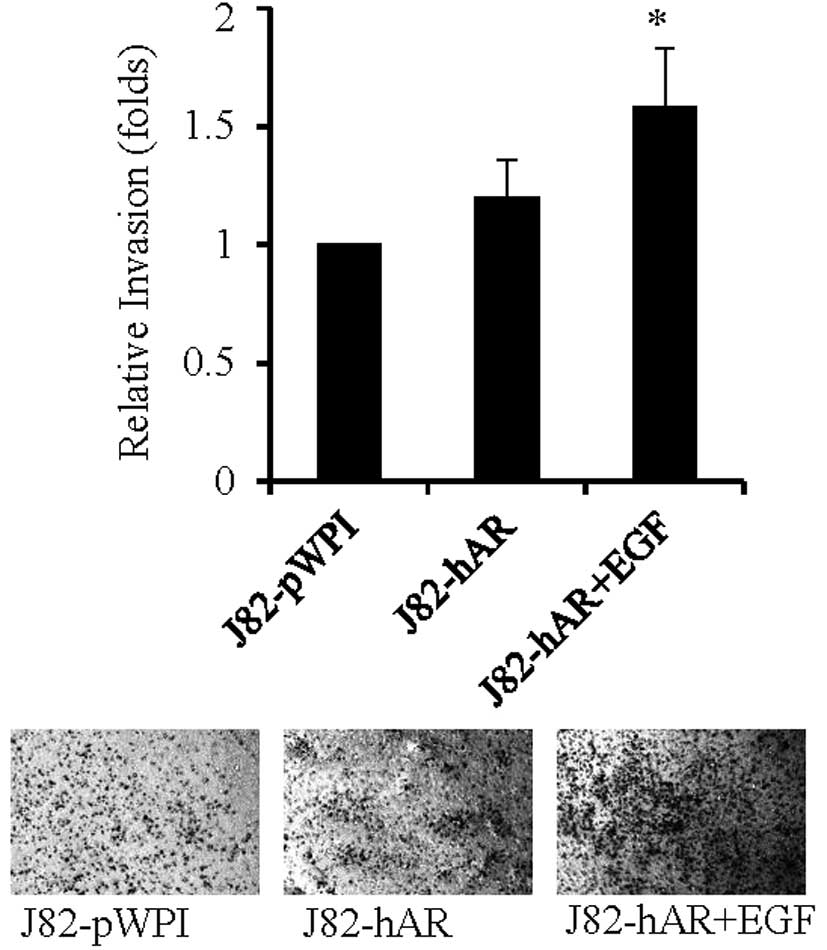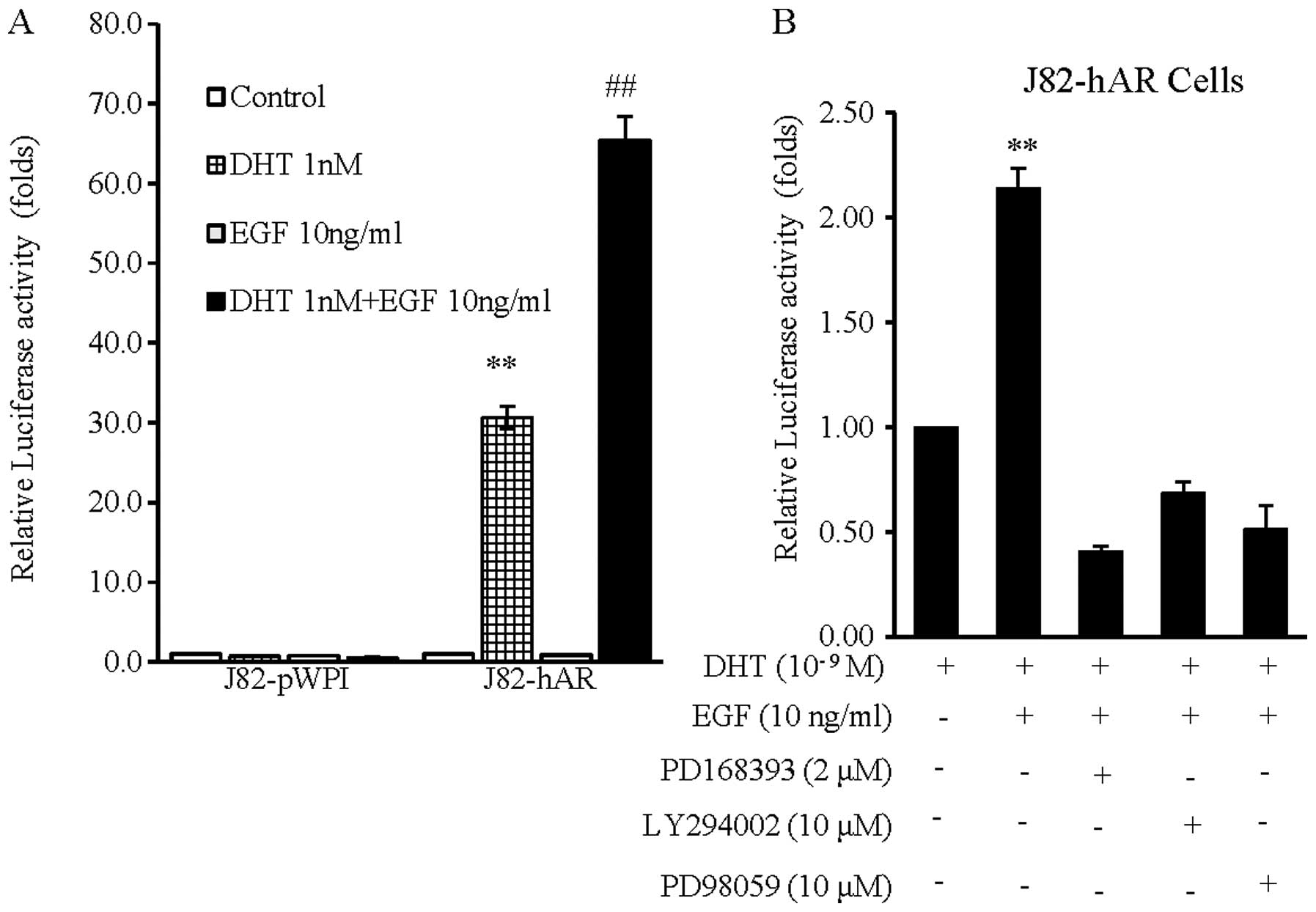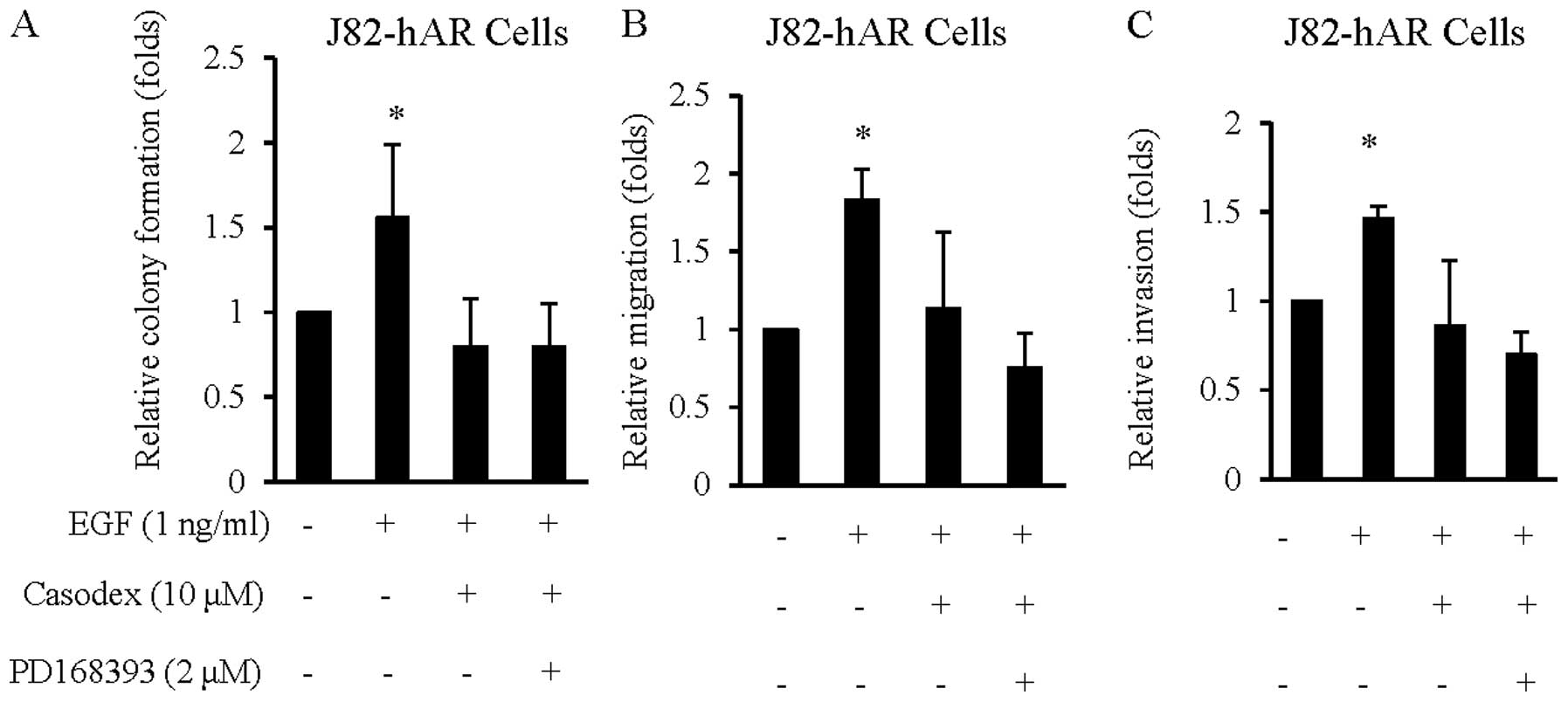|
1
|
Siegel R, Ward E, Brawley O and Jemal A:
Cancer statistics, 2011: the impact of eliminating socioeconomic
and racial disparities on premature cancer deaths. CA Cancer J
Clin. 61:212–236. 2011. View Article : Google Scholar : PubMed/NCBI
|
|
2
|
Shariat SF, Sfakianos JP, Droller MJ,
Karakiewicz PI, Meryn S and Bochner BH: The effect of age and
gender on bladder cancer: a critical review of the literature. BJU
Int. 105:300–308. 2010. View Article : Google Scholar : PubMed/NCBI
|
|
3
|
Fajkovic H, Halpern JA, Cha EK, et al:
Impact of gender on bladder cancer incidence, staging, and
prognosis. World J Urol. 29:457–463. 2011. View Article : Google Scholar : PubMed/NCBI
|
|
4
|
Miyamoto H, Yang Z, Chen YT, et al:
Promotion of bladder cancer development and progression by androgen
receptor signals. J Natl Cancer Inst. 99:558–568. 2007. View Article : Google Scholar : PubMed/NCBI
|
|
5
|
Imada S, Akaza H, Ami Y, Koiso K, Ideyama
Y and Takenaka T: Promoting effects and mechanisms of action of
androgen in bladder carcinogenesis in male rats. Eur Urol.
31:360–364. 1997.PubMed/NCBI
|
|
6
|
Heinlein CA and Chang C: The roles of
androgen receptors and androgen-binding proteins in nongenomic
androgen actions. Mol Endocrinol. 16:2181–2187. 2002. View Article : Google Scholar : PubMed/NCBI
|
|
7
|
Grivas PD, Day M and Hussain M: Urothelial
carcinomas: a focus on human epidermal receptors signaling. Am J
Transl Res. 3:362–373. 2011.PubMed/NCBI
|
|
8
|
Kanno N, Nonomura N, Miki T, et al:
Effects of epidermal growth factor on the invasion activity of the
bladder cancer cell line. J Urol. 159:586–590. 1998. View Article : Google Scholar
|
|
9
|
Kawamata H, Azuma M, Kameyama S, Nan L and
Oyasu R: Effect of epidermal growth factor/transforming growth
factor alpha and transforming growth factor beta 1 on growth in
vitro of rat urinary bladder carcinoma cells. Cell Growth Differ.
3:819–825. 1992.PubMed/NCBI
|
|
10
|
Rowinsky EK: The erbB family: targets for
therapeutic development against cancer and therapeutic strategies
using monoclonal antibodies and tyrosine kinase inhibitors. Annu
Rev Med. 55:433–457. 2004. View Article : Google Scholar
|
|
11
|
Lipponen P and Eskelinen M: Expression of
epidermal growth factor receptor in bladder cancer as related to
established prognostic factors, oncoprotein (c-erbB-2, p53)
expression and long-term prognosis. Br J Cancer. 69:1120–1125.
1994. View Article : Google Scholar : PubMed/NCBI
|
|
12
|
Sauter G, Haley J, Chew K, et al:
Epidermal-growth-factor-receptor expression is associated with
rapid tumor proliferation in bladder cancer. Int J Cancer.
57:508–514. 1994. View Article : Google Scholar : PubMed/NCBI
|
|
13
|
Chow NH, Chan SH, Tzai TS, Ho CL and Liu
HS: Expression profiles of ErbB family receptors and prognosis in
primary transitional cell carcinoma of the urinary bladder. Clin
Cancer Res. 7:1957–1962. 2001.PubMed/NCBI
|
|
14
|
Culig Z, Hobisch A, Cronauer MV, et al:
Androgen receptor activation in prostatic tumor cell lines by
insulin-like growth factor-I, keratinocyte growth factor, and
epidermal growth factor. Cancer Res. 54:5474–5478. 1994.
|
|
15
|
Ma WL, Hsu CL, Yeh CC, et al: Hepatic
androgen receptor suppresses hepatocellular carcinoma metastasis
through modulation of cell migration and anoikis. Hepatology.
56:176–185. 2012. View Article : Google Scholar : PubMed/NCBI
|
|
16
|
Nguyen PL, Swanson PE, Jaszcz W, et al:
Expression of epidermal growth factor receptor in invasive
transitional cell carcinoma of the urinary bladder. A multivariate
survival analysis. Am J Clin Pathol. 101:166–176. 1994.PubMed/NCBI
|
|
17
|
Chow NH, Tzai TS, Lin SN, Chan SH and Tang
MJ: Reappraisal of the biological role of epidermal growth factor
receptor in transitional cell carcinoma. Eur Urol. 24:140–143.
1993.PubMed/NCBI
|
|
18
|
Zheng Y, Izumi K, Yao JL and Miyamoto H:
Dihydrotestosterone upregulates the expression of epidermal growth
factor receptor and ERBB2 in androgen receptor-positive bladder
cancer cells. Endocr Relat Cancer. 18:451–464. 2011. View Article : Google Scholar : PubMed/NCBI
|
|
19
|
Brass AL, Barnard J, Patai BL, Salvi D and
Rukstalis DB: Androgen up-regulates epidermal growth factor
receptor expression and binding affinity in PC3 cell lines
expressing the human androgen receptor. Cancer Res. 55:3197–3203.
1995.PubMed/NCBI
|
|
20
|
Migliaccio A, Di Domenico M, Castoria G,
et al: Steroid receptor regulation of epidermal growth factor
signaling through Src in breast and prostate cancer cells: steroid
antagonist action. Cancer Res. 65:10585–10593. 2005. View Article : Google Scholar
|
|
21
|
Craft N, Shostak Y, Carey M and Sawyers
CL: A mechanism for hormone-independent prostate cancer through
modulation of androgen receptor signaling by the HER-2/neu tyrosine
kinase. Nat Med. 5:280–285. 1999. View
Article : Google Scholar : PubMed/NCBI
|
|
22
|
Culig Z, Hobisch A, Cronauer MV, et al:
Regulation of prostatic growth and function by peptide growth
factors. Prostate. 28:392–405. 1996. View Article : Google Scholar : PubMed/NCBI
|
|
23
|
Heinlein CA and Chang C: Androgen receptor
in prostate cancer. Endocr Rev. 25:276–308. 2004. View Article : Google Scholar : PubMed/NCBI
|
|
24
|
Putz T, Culig Z, Eder IE, et al: Epidermal
growth factor (EGF) receptor blockade inhibits the action of EGF,
insulin-like growth factor I, and a protein kinase A activator on
the mitogen-activated protein kinase pathway in prostate cancer
cell lines. Cancer Res. 59:227–233. 1999.
|
|
25
|
Chen T, Cho RW, Stork PJ and Weber MJ:
Elevation of cyclic adenosine 3′,5′-monophosphate potentiates
activation of mitogen-activated protein kinase by growth factors in
LNCaP prostate cancer cells. Cancer Res. 59:213–218. 1999.
|
|
26
|
Gregory CW, Fei X, Ponguta LA, et al:
Epidermal growth factor increases coactivation of the androgen
receptor in recurrent prostate cancer. J Biol Chem. 279:7119–7130.
2004. View Article : Google Scholar : PubMed/NCBI
|
|
27
|
Orio F, Terouanne B, Georget V, et al:
Potential action of IGF-1 and EGF on androgen receptor nuclear
transfer and transactivation in normal and cancer human prostate
cell lines. Mol Cell Endocrinol. 198:105–114. 2002. View Article : Google Scholar : PubMed/NCBI
|
|
28
|
Kassouf W, Dinney CPN, Brown G, et al:
Uncoupling between epidermal growth factor receptor and downstream
signals defines resistance to the antiproliferative effect of
Gefitinib in bladder cancer cells. Cancer Res. 65:10524–10535.
2005. View Article : Google Scholar
|
|
29
|
Ma WL, Hsu CL, Wu MH, et al: Androgen
receptor is a new potential therapeutic target for the treatment of
hepatocellular carcinoma. Gastroenterology. 135:947–955. 955.e1–5.
2008.PubMed/NCBI
|
|
30
|
Wu JT, Han BM, Yu SQ, Wang HP and Xia SJ:
Androgen receptor is a potential therapeutic target for bladder
cancer. Urology. 75:820–827. 2010. View Article : Google Scholar : PubMed/NCBI
|















